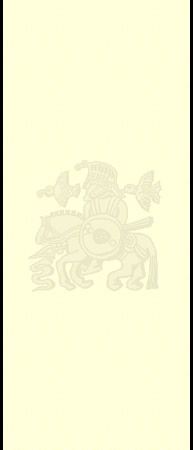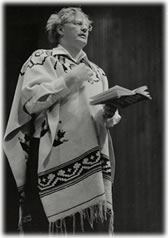



| Web site design and maintenance by Akikaze Media Services. All content of this site, unless otherwise noted, is copyright ©2001 Robert Bly. All Rights Reserved. Any duplication, in any form without the written consent of the copyright holder is prohibited. |
Interviewer: You wrote your first poem against the Vietnam War in 1964. It seems strange that these poems come so soon after the Snowy Fields poems in 1962.
 Robert Bly: It felt that way to me too. Suddenly everything changed. It was a hard time. No one knew what to do. Some of the older poets–Berryman was one–thought it was bad taste for a poet to participate in a public meeting. (I didn't think so.) At the start none of us had written any protest poems ourselves, so we recited E. E. Cummings, Adolf Hitler, William Stafford, I. F. Stone, Robinson Jeffers, etc. The Swedish poet Goran Sonnevi wrote the first good poem about the War, and we read that poem in English. After a few months, a number of poets of all stripes joined an umbrella organization David Ray and I set up called American Writers Against the Vietnam War. The first read-in we did was at Reed College–I think Ferlinghetti was there. Louis Simpson helped a lot. The veterans of World War II like Louis, whose company was wiped out at Bastogne, were effective when right-wingers shouted at us from the balcony, "You're all cowards!" "Go back to Russia!"
Robert Bly: It felt that way to me too. Suddenly everything changed. It was a hard time. No one knew what to do. Some of the older poets–Berryman was one–thought it was bad taste for a poet to participate in a public meeting. (I didn't think so.) At the start none of us had written any protest poems ourselves, so we recited E. E. Cummings, Adolf Hitler, William Stafford, I. F. Stone, Robinson Jeffers, etc. The Swedish poet Goran Sonnevi wrote the first good poem about the War, and we read that poem in English. After a few months, a number of poets of all stripes joined an umbrella organization David Ray and I set up called American Writers Against the Vietnam War. The first read-in we did was at Reed College–I think Ferlinghetti was there. Louis Simpson helped a lot. The veterans of World War II like Louis, whose company was wiped out at Bastogne, were effective when right-wingers shouted at us from the balcony, "You're all cowards!" "Go back to Russia!"
Galway Kinnell and I sometimes joined to do a series of readings. Once in upstate New York we gave three readings in one day, flying from Albany to Syracuse to Buffalo. That night we ended up at a diner. Suddenly a drunk in the diner, not knowing anything about us at all, said, "You want to know what I did during the Korean War?" "Well, what did you do?" "I was a rear gunner. We were coming back from a bombing raid, and the pilot for some reason flew right down the main street of this little Korean town. I had some ammunition left. You know what I did? I lowered my guns and shot every Korean I could see walking on either side of the street. What do you think about that? Why did I do that?"
That's what that time was like. Old stuff came up.
Most of the English teachers in the universities hated our doing "political poems," as they were called. That still happens. When I'm at a reception at a university these days, an English professor may come up to me and ask: "How do you feel now about those poems you wrote during the War?" They want me to disown the poems. I say, "I'm sorry I didn't write more of them."
Interviewer: Were you thinking of Whitman when you wrote "The Teeth Mother Naked at Last?"
Robert Bly: Well, the long Whitman line seemed proper. "Wings appear over the trees, wings with eight hundred rivets."
Robert Duncan wrote the lines:
the hell of America's unacknowledged, unrepented crimes that I saw in Goldwater's eyes
now shines from the eyes of the President
in the swollen head of the nation.
So Whitman's work was the model. The longer lines require to be lifted, as Whitman's are, by an increasing or persisting energy. Long lines are flung out. It was as if they were held up by the same sort of energy that holds up the plane's wings–the same sort of energy that supported the protestors during that long war.
Actually, I had been working on political poetry for several years before the war started. I was looking at American history from the point of view of Jacob Boehme, who insisted on distinguishing the outward men from the inward man. These poems were printed in a book called The Light Around the Body, along with some of the poems about Vietnam.
Interviewer: That book received the National Book Award in 1968, which resulted in the speech you gave at the National Book Awards night.
Robert Bly: That speech did cause some controversy. I said that there is something wrong in complimenting ourselves on our literary grandness when we are destroying a culture that probably has a longer literary tradition than we have.
Interviewer: You gave the $1,000 check to a Resistance member, as I recall, during the speech.
Robert Bly: I went down to the Resistance office in lower Manhattan, and said, "I know how you guys can get a thousand dollars." They said, "That's great! How do we do it?" "Just have someone come to the Book Awards ceremony tomorrow night, and I'll pass the check to him." They said, "It should be someone with a suit. I know someone who has a suit!" That was charming.
Interviewer: If the Vietnam War happened again, or now, would you spend all that energy and time protesting it?
Robert Bly: Certainly.